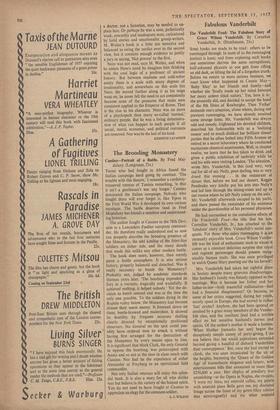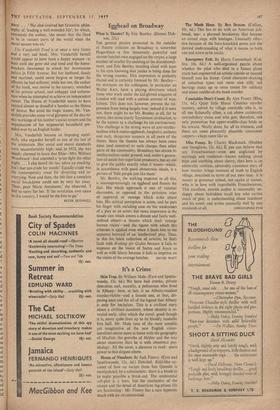Fabulous Vanderbilt
SOME books are made to be read : others to be rummaged through. In most of us the rummaging instinct is keen; and from exploring such books one sometimes derives the same surreptitious, half-ashamed pleasure as one gets from rifling an old desk, or lifting the lid of a forgotten trunk. Before we return to more serious business, we must know what happened to Cousin May— 'Baby May' to her friends and family—and whether she 'finally made up her mind between her many ardent titled suitors.' Yes, here it is: she presently did, and decided to accept the hand of the 8th Duke of Roxburghe. Then 'Father' demands one's attention, about whom, during our previous rummaging, we have already received some strange hints. Mr. Vanderbilt was always odd and moody, frightened his devoted children, described his fashionable wife as a 'waltzing mouse' and so much disliked her brilliant dinner parties that he often bolted into Fifth Avenue or retired to a secret laboratory where he conducted mysterious chemical experiments. Well, in chapter twelve, we learn that he has taken to drink and given a public exhibition of inebriety while he and his wife were visiting London. 'The situation,' wrote Mrs. Vanderbilt, 'is this (and very, very sad for all of us). Neily, poor darling, was so very drunk this evening . . . in the restaurant at dinner that, before we had our dessert, Reggie Pembroke very kindly put his arm into Neily's and led him through the dining-room and up to our rooms where he left Neily asleep on the sofa.' Mr. Vanderbilt afterwards escaped to his yacht, and there passed the remainder of his existence under the guardianship of his personal physician.
He had succumbed to the cumulative effects of The Vanderbilt Feud—the title that his son, Cornelius Vanderbilt, Jr.,. has attached to the 'fabulous' story of Mrs. Vanderbilt's social con- quests. For those who enjoy rummaging it is an unusually enjoyable book. Grace Wilson Vander- bilt was the kind of enthusiastic snob to whom it comes as a constant delicious surprise that royal and regnant personages should possess recog- nisably human traits. She was once privileged to watch Queen Mary pouring out the tea herself!
Mrs. Vanderbilt had taken her rightful place in Society despite many grievous disadvantages. Her husband's family was fiercely opposed to the marriage. Was it because her father and her father-in-law—both masterful millionaires—had had a financial disagreement? Or because, as some of her critics suggested, during her youth, mostly spent in Europe, she had moved in rather 'fast' circles? Anyhow, she had been ignored or insulted by a great many members of the Vander- bilt clan, and the resultant feud had a terrible effect on her sensitive husband's nerves and spirits. Of the author's mother it made a hostess. 'When Mother (remarks her son] began the deceptively simple career of party-giving, I do not believe that her social aspirations extended beyond giving a handful of diehard Vanderbilts their comeuppance.' But, once she had started to climb, she was soon intoxicated by the air of the heights, becoming the 'Queen of the Golden Age' of transatlantic elegance and -luxury, with entertainment bills that amounted to more than $250,000 a year. Her display of jewellery was astonishing—at the Opera in Naples, she records, 'I wore my tiara, my emerald collar, my pearls with emerald piece Belle gave me, my diamond fringe across the front of my gown (they admire that extravagantly) and my other emerald
Piece. . . .' She also evolved her favourite philo- sophy of 'leading a well-Founded life'; by which, comments the author, 'she meant that she liked to be in various parts of the world when the social season was on.'
The Vanderbilt Feud is at once a very funny and a very sad book. Mrs. Vanderbilt herself would appear to have been a happy woman—at least until she grew old and tired and the home- breakers threatened to attack her brownstone Palace in Fifth Avenue. But her husband, dandy and martinet, could never forgive or forget the affronts he had suffered; while her son, the author Of the book, was restive in the nursery, wretched at his private school, and unhappy and unfortu- nate when he attempted to achieve an independent career. The House of Vanderbilt seems to have carried almost as dreadful a burden as the House of Atreus. But amid his tragic scenes, Mr. Van- derbilt provides some vivid glimpses of the day-to- day workings of his mother's social system and the organisation of her seigneurial household pre- sided over by an English butler.
Mrs. Vanderbilt became an imposing matri- arch, who regarded herself as one of the last of the aristocrats. Her social and moral standards were uncomfortably high; and, in 1912, she was deeply alarmed to learn that Elsie—Mrs. William Woodward—had attended a 'prize fight the other night. . . I also heard she has taken up smoking. Isn't that too crude for words!' Equally crude was the contemporary craze for divorcing and re- marrying. Now and then, she felt that a complete social breakdown could not be very far away. 'Dear, poor Marie Antoinette,' she observed, 'I feel so sorry for her. If the revolution ever came to this country, I would be the first to go.'
PETER QIJENNELL



































 Previous page
Previous page